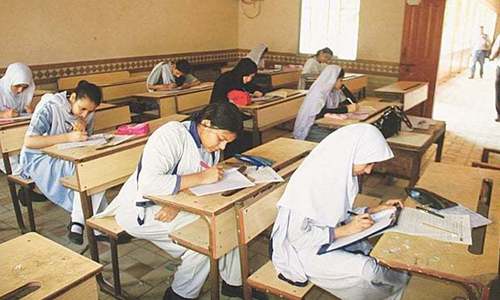Sindh Health Minister Dr Azra Pechuho said on Thursday that schools in the province would remain closed until the government was certain that coronavirus cases were on the decline.
Addressing a press conference in Karachi, flanked by Information Minister Nasir Shah, the health minister said: "This is a numbers game. We have to proceed with caution until the numbers improve and don't want to risk the lives of our children, their parents and relatives.
"So schools will remain closed until we (the Sindh government) are certain that the numbers (of coronavirus cases) are decreasing and won't increase."
Earlier on May 19, the National Command and Operation Centre had allowed the staggered reopening of educational institutions from May 24 in districts where the positivity rate was less than five per cent. Punjab School Education Minister Murad Raas had also set the date for schools reopening in Punjab from June 7.
During the press conference on Thursday, Pechuho said that the inoculation campaign for teachers and educational staff was also being sped up and planning was being done with the education department on how to vaccinate every staff member so students didn't get infected from them.
"We want to ensure [for schools] that there is complete health protection and a child doesn't get infected with the virus at school."
The health minister's comments came in the wake of the prime minister allowing the Sindh government to extend lockdown restrictions for another week to curb the spread of the coronavirus in the province.
Despite no decision on schools reopening in Sindh, Education Minister Saeed Ghani said on Tuesday that matriculation and intermediate exams in the province would be held in July and the decision regarding exams of classes up to eight would be made within the next few days.
Responding to a question about the vaccines being administered to students going abroad, Pechuho said a plan was being made for students whose semester would start in September in the UK, US and other countries.
"We are restricting the incoming Pfizer [doses] for students who are going abroad for studies," the health minister said, adding that the reason for this was the UK's condition for vaccinations with either the Pfizer or AstraZeneca jabs — not that other vaccines were not effective.
"Since our Pfizer supplies are low, we will try to administer these mostly to those students."
Inoculation target
Giving updates on Sindh's ongoing vaccination campaign, Pechuho said numerous professions, groups, organisations and communities had been approached to open vaccination centres for them.
She said a number of services had been launched or would soon be launched to increase the reach of the vaccination drive such as inoculations at home, mobile vaccination centres and vaccination centres at basic health units.
"The target we have set is 18 million doses to be administered to people in three months and we will be successful in achieving this target with people's support and cooperation," she said.
The minister added that the vaccination campaign would be sped up greatly and that the federal government had also given the assurance that the supply chain of vaccines would not be disrupted.
Talking about vaccine misconceptions, Pechuho urged the public to approach experts about them and desist from highlighting rumours or misrepresentations since they had the potential to do "great damage" and create hesitation among the people.
Providing details on the four cases of the Indian coronavirus variant found on May 29, she said the patients had been successfully isolated and quarantined, with the result that the variant's spread in the community was prevented.
Asked about vaccinations for people without identity cards, Pechuho said whether they were "non-citizens or illegal immigrants", they would only need to provide any form of identity such as a passport or if that was not present, then details such as their name and telephone number would suffice.
"Those people are, after all, living here so if we don't vaccinate them they can spread it (the virus)."















































